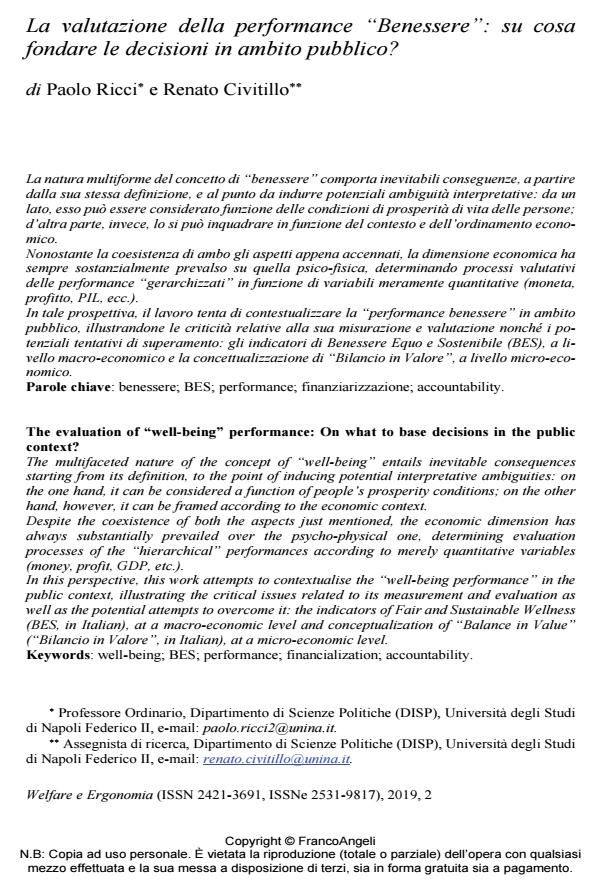The evaluation of "well-being" performance: On what to base decisions in the public context?
Journal title WELFARE E ERGONOMIA
Author/s Paolo Ricci, Renato Civitillo
Publishing Year 2020 Issue 2019/2
Language Italian Pages 16 P. 31-46 File size 241 KB
DOI 10.3280/WE2019-002003
DOI is like a bar code for intellectual property: to have more infomation
click here
Below, you can see the article first page
If you want to buy this article in PDF format, you can do it, following the instructions to buy download credits

FrancoAngeli is member of Publishers International Linking Association, Inc (PILA), a not-for-profit association which run the CrossRef service enabling links to and from online scholarly content.
The multifaceted nature of the concept of "well-being" entails inevitable consequences starting from its definition, to the point of inducing potential interpretative ambiguities: on the one hand, it can be considered a function of people’s prosperity conditions; on the other hand, however, it can be framed according to the economic context. Despite the coexistence of both the aspects just mentioned, the economic dimension has always substantially prevailed over the psycho-physical one, determining evaluation processes of the "hierarchical" performances according to merely quantitative variables (money, profit, GDP, etc.). In this perspective, this work attempts to contextualise the "well-being performanc" in the public context, illustrating the critical issues related to its measurement and evaluation as well as the potential attempts to overcome it: the indicators of Fair and Sustainable Wellness (BES, in Italian), at a macro-economic level and conceptualization of "Balance in Value" ("Bilancio in Valore", in Italian), at a micro-economic level.
Keywords: Well-being; BES; performance; financialization; accountability.
- Encyclopedia of Sustainable Management Renato Civitillo, pp.28 (ISBN:978-3-031-25983-8)
- Introduzione Marco Musella, Paolo Ricci, Benedetta Siboni, in WELFARE E ERGONOMIA 2/2023 pp.7
DOI: 10.3280/WE2022-002001 - Encyclopedia of Sustainable Management Renato Civitillo, pp.1 (ISBN:978-3-030-02006-4)
Paolo Ricci, Renato Civitillo, La valutazione della performance "Benessere": su cosa fondare le decisioni in ambito pubblico? in "WELFARE E ERGONOMIA" 2/2019, pp 31-46, DOI: 10.3280/WE2019-002003